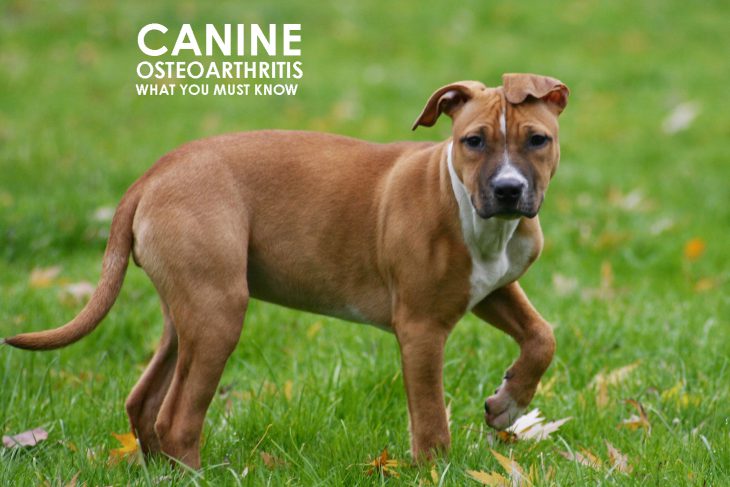If you notice that your dog has been showing a reluctance to jump on the sofa, climb stair, or display an aversion to taking long walks, it could be that you four-legged companion is suffering from canine osteoarthritis.
What is Canine Osteoarthritis?
According to the American Kennel Club Canine Health Foundation, “Osteoarthritis occurs when the cartilage protecting the bones of the joint is destroyed. The joint loses its cushion, causing friction between bones, leading to pain and decreased mobility in affected joints. Inflammation of the cartilage can also stimulate bony growths (spurs) to form around the joints. Since cartilage has no nerve supply, damage can progress with no outward symptoms until the joint is severely damaged and the lubricating fluid has lost its ability to protect the bone surfaces.”*
What causes Osteoarthritis in Dogs?
Osteoarthritis is categorized as either developmental or degenerative. Developmental osteoarthritis is when the joints do not develop normally for example: hip dysplasia. Degenerative osteoarthritis in dogs happens when the cruciate ligament wears away over time and causes instability.
What are the Symptoms of Canine Osteoarthritis?
Overall, a dog will slow down. A dog with osteoarthritis will avoid jumping on or off the couch, running, or even chasing after a ball. The dog will also have difficulty climbing stairs or getting into a vehicle. As the level of discomfort increases, a dog will start to exhibit lameness – holding a limb up or at an odd angle.
Is Canine Osteoarthritis Breed Specific?
Breeds such as Rottweilers, Bernese Mountain, and large breed dogs are known to have a predisposition to osteoarthritis. However, just about any breed can be affected. In addition, age, obesity, and level of activity are contributing factors to developing osteoarthritis.
How is Canine Osteoarthritis Treated?
Osteoarthritis in dog is addressed in two ways: surgical and non-surgical. The surgical treatment involves replacing the afflicted joint, or an arthroscopic cleaning of the joint. Quality of life, recovery times, and costs need to be considered when taking the surgical route. The non-surgical approach involves physical therapy, weight management and administering medication to reduce inflammation and pain. Also the use of vitamins and supplements can be useful in treating canine osteoarthritis.
Arthritis Medications for Dogs
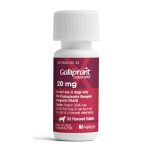 Galliprant (Grapiprant) Flavored Tablets are for the control of pain and inflammation associated with osteoarthritis in dogs. Galliprant (Grapiprant) is a new class of anti-inflammatory that targets pain, so your dog can get pain relief from the earliest diagnosed stages of osteoarthritis.
Galliprant (Grapiprant) Flavored Tablets are for the control of pain and inflammation associated with osteoarthritis in dogs. Galliprant (Grapiprant) is a new class of anti-inflammatory that targets pain, so your dog can get pain relief from the earliest diagnosed stages of osteoarthritis.
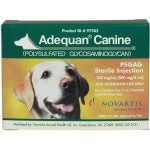 Adequan Canine is recommended for the control of signs associated with non-infectious degenerative and/or traumatic arthritis of canine synovial joints and following surgical procedures involving a joint.
Adequan Canine is recommended for the control of signs associated with non-infectious degenerative and/or traumatic arthritis of canine synovial joints and following surgical procedures involving a joint.
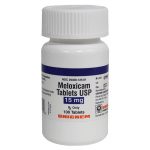 Meloxicam is a nonsteroidal anti-inflammatory drug used to relieve the symptoms of arthritis, primary dysmenorrhea, and fever; and as an analgesic, especially where there is an inflammatory component.
Meloxicam is a nonsteroidal anti-inflammatory drug used to relieve the symptoms of arthritis, primary dysmenorrhea, and fever; and as an analgesic, especially where there is an inflammatory component.
Joint Supplements for Dogs
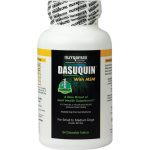 Dasuquin with MSM is a joint supplement for dogs with a tasty proprietary combination of MSM, natural glucosamine and ingredients that have been shown to work against cartilage breakdown.
Dasuquin with MSM is a joint supplement for dogs with a tasty proprietary combination of MSM, natural glucosamine and ingredients that have been shown to work against cartilage breakdown.
 VetCrafted Joint Care Soft Chews with MSM for Dogs provides a comprehensive blend of essential minerals and nutrients for your dog’s daily joint needs. In a great tasting beef flavor they will think are treats!
VetCrafted Joint Care Soft Chews with MSM for Dogs provides a comprehensive blend of essential minerals and nutrients for your dog’s daily joint needs. In a great tasting beef flavor they will think are treats!
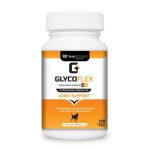 GLYCO-FLEX III provides maximum support for joint function and connective tissue health in dogs with severe joint dysfunction.
GLYCO-FLEX III provides maximum support for joint function and connective tissue health in dogs with severe joint dysfunction.
In summary, canine osteoarthritis is when a joint’s cartilage is worn to the point it no longer cushions the joint. Large breed dogs are very susceptible to osteoarthritis, but older dogs as well as obese dogs can be affected too. Signs a dog might have osteoarthritis are a reluctance to running, taking long walks, not wanting to chase after things, difficulty climbing stairs, and lameness. A veterinarian will be able to provide a complete diagnoses and recommend a treatment plan. Depending on the level of discomfort a dog is feeling, a veterinarian will either prescribe surgery or non-surgical methods to treat canine osteoarthritis.
*American Kennel Club Canine Health Foundation. “Managing Canine Arthritis” September 19, 2011. https://www.akcchf.org/canine-health/your-dogs-health/caring-for-your-dog/managing-canine-arthritis.html?referrer=https://www.google.com/ Accessed on February 20, 2017.

